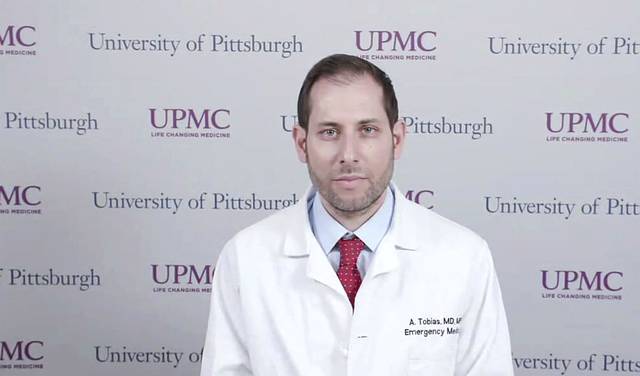The first death related to coronavirus has been recorded in Pennsylvania and cases continue to rise in the state.
So how should citizens deal with the spread of virus as it hits home?
We posed that question and others to Dr. Adam Tobias, emergency medicine physician at UMPC. In an interview via video teleconferencing with the Trib, Dr. Tobias talked about when to call the doctor to get that initial screen, what care looks like in the absence of prescribable treatment, and myths about the coronavirus that causes covid-19.
Here are some of the highlights from the video interview:
Question: How does the first death from coronavirus in Pennsylvania change the landscape?
Answer: This is something that we’ve been preparing for during the last couple of months actually. UPMC has a long history of disaster preparedness. We have a lot of experience in preparing for all scope of disasters from mass casualty situations to highly infectious disease situations. So, over the last couple of months we’ve really been ramping up our efforts working with local, county, state and federal public health officials to be sure that we are ready to handle the patients that we’re going to receive from this.
We feel ready. We have an extensive hospital network, we have a very robust system with a lot of active and ready and engaged providers who are here to take care of the patients of the city of Pittsburgh and the patients in the region as this situation escalates.
Q: When should someone call their doctor to get that initial screen?
A: If you feel that you are experiencing symptoms potentially related to covid-19, be it shortness of breath, cough, fever or other concerns because you were perhaps exposed to someone else who has it or is at risk for it, that would be the time to reach out to your primary care doctor. Or through UPMC, you can do a UMPC AnywhereCare visit online and have a consultation that way.
We would like to discourage people from coming directly to the emergency department if they are not having severe symptoms. If you have a high fever or you’re having difficulty breathing, the emergency department is there and we’re ready to take care of you.
Q: In the absence of prescribable treatment, what would care look like?
A: Care for the most part is what we would call supportive care. Just like with the flu, most of it is staying hydrated, staying home, staying away from other people whom you could potentially infect.
For people who have more severe illness, we do have other treatments in the hospital such as supplemental oxygen, sometimes IV fluids or other IV medications. But at the moment, there is no specific medication that cures this disease. There are a lot of experimental treatments that are being tried around the world but we’re not quite there yet in terms of having a specific treatment or vaccine for this.
Q: What myths would you like to dispel?
A: I have heard of several myths. Most of these are floating around on the internet, things like, “If I can hold my breath for a certain amount of time then I don’t have this.” That’s completely false.
Things like, “If I drink hot water, then this will go away.” That is completely false.
Or that certain segments of the population are immune to this, which is also false.
It’s just like everything else on the internet. Don’t believe everything that you read. We know that people are afraid and people are anxious. There will always be people out there on the internet that will try to take advantage of that to try and make money.
So, try to ignore some of the outrageous claims that you are hearing right now.








